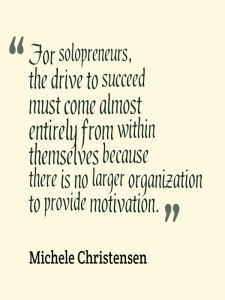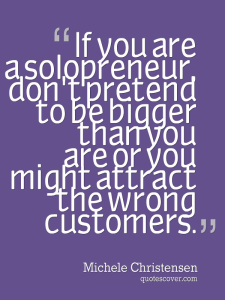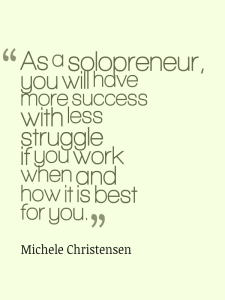 As a solopreneur, much of your success comes from yourself. You may be thinking I’ve just stated the obvious – who else could it come from in a one-person business? It is true that there’s nobody else in a one-person business, but there are some specific business features that must come from yourself when you are solopreneur that typically come from someone or something external to you when you work in a larger organization.
As a solopreneur, much of your success comes from yourself. You may be thinking I’ve just stated the obvious – who else could it come from in a one-person business? It is true that there’s nobody else in a one-person business, but there are some specific business features that must come from yourself when you are solopreneur that typically come from someone or something external to you when you work in a larger organization.
For starters, your motivation has to come solely from yourself. There’s no boss to report to, no external deadlines to meet and nobody knows if you meet your goals or not unless you deliberately place some accountability partners in your life. If you aren’t motivated to just get to work and do what needs to be done by yourself, you may not enjoy being a solopreneur. If you need some external force to help you get things done, having a coach or mastermind group can help but you have to take action and make that happen for yourself.
Second, your schedule is entirely dictated by yourself. There are no office policies or employee manuals to tell you how to schedule your day or week. The “office” is always open, so nights and weekends are tempting targets for your work if you aren’t careful. Over the longer haul, it’s up to you to take a big-picture view of what needs to happen over the week, month and year to keep your business growing and keep you happy. As a solopreneur, your schedule is complicated. You’ve got to do the money-making work, but you also have to do all the other jobs such as marketing, administration and paperwork. If you can’t manage to make and stick to a schedule (and be willing to chuck it out the window when things change!), you may not be able to have a solopreneur business.
Third, it’s up to you to build some structure in your business. There are no departments, policy manuals, or reports like there would be in a bigger company so it’s easy to end up with absolutely no structure to your business whatsoever. It’s important to not go overboard and create a rigid, bulky business that loses all the advantages of being a solopreneur but you do need to create some structure in your business. There are certain maintenance chores that should be done on a regular basis such as looking at some numbers, banking, filing, taxes and license renewals. You need some structure to make sure these things can and do get done on time.
It takes a distinct type of person to be a solopreneur, and one of the biggest traits is that you are internally motivated. You can hold yourself accountable and get things done even when nobody is looking. How does your personality fit with being a solopreneur? Tell me about it in the comments.
Being a solopreneur is really rewarding and fun if it’s a good fit for your personality. That’s one of thing I help you explore in my book “Is a Solopreneur Business Right for You?” If you are thinking of starting a small business and wonder if you could make it as a one-person shop, grab the book here and see if you’d be happy and successful as a solopreneur.









